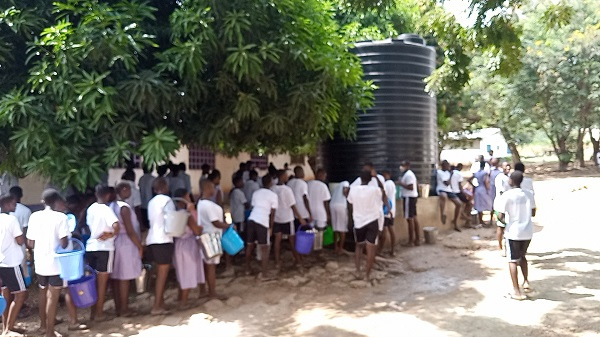In a distressing turn of events, students from several Senior High Schools in the Krobo District of Ghana find themselves grappling with a severe water crisis after the Ghana Water Company Limited (GWCL) disconnected their water supply. This drastic measure was taken due to the schools’ accumulating debts to the service provider.
The affected schools include Yilo Krobo SHS, Krobo Girls SHS, Anum Presby SHS, Anum Presby Vocational Institute, Boso Senior High Technical, and Akro Senior High Technical Schools. Despite the dire situation, Krobo Girls Senior High School has managed to settle its outstanding bill of GHC590,000.
At Akro Senior High Technical School, where the water supply has been cut off, students are now forced to endure long queues at the only borehole serving the school community. The school reportedly owes GWCL a substantial amount of GHC700,000. With nearly 1,000 first and third-year students, the absence of a reliable water source has severely impacted their daily activities, including drinking, cooking, cleaning, washing, and more.
The situation is mirrored at Boso Senior High Technical School, where the entire student community depends solely on a mechanized borehole on campus. The lack of water is affecting both academic and co-curricular activities, as students spend considerable time searching for water.
Students have voiced their grievances, citing the adverse effects on their academic performance. The compound prefect of Akro Senior High Technical School, Awuah Eric Akwasi, lamented, “We need to wake up at dawn to come and join this long queue. Sometimes we also fetch it to our teachers in their bungalows so by the time we get to our classrooms, we’re tired, we can’t even concentrate, so we sleep in class.”
A final year female student highlighted the additional challenges faced by female students during their menstrual cycles due to the water shortage. Expressing concern, she stated, “The water problem in our school is affecting us negatively. At times, we, those who are in our menses, suffer a lot.”
Appealing for immediate government intervention, the final year students emphasized that if the situation is not promptly addressed, it could have adverse effects on their preparations for the upcoming West African Senior School Certificate Examination (WASSCE).
Teachers, who also reside on the school’s campus, are equally affected. A teacher, speaking on condition of anonymity, stressed, “The teachers in residence, it’s actually a problem because that is our source of water…so every member of the school community is affected.”
Despite bringing the challenges to the attention of the Regional Directorate of Education, the school’s management reports that the problem has yet to be addressed. Students and staff are now fervently appealing to the government and individuals to come to their aid and put an end to the students’ struggle for water on campus.


